(VOVworld) - According to Ministry of Transport, Public Works and Water Management of the Netherlands, there are more bicycles than residents in this country. There 27% of all trips are made by bike. With more than 18 million bicycles and 1,2 million new ones sold every year, the Netherlands is considered a cyclist’s heaven. Today we meet with Julia Van Herwaarden, a Dutch volunteer teacher at Hanoi University, to learn more about her country’s cycling culture.
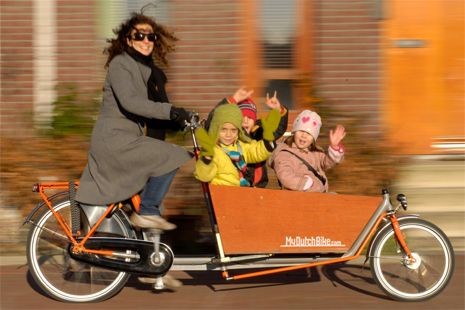 |
This is multi-purposed bike is called Bakfiet in Dutch. With super-capacity cargo space, it can almost replace a car (Photo: realdutchbikes.com)
|
Q: Hello Julia, thank you for joining us again on Culture Rendezvous. Is it true that the Netherlands is called the bicycle capital of the world?
A; Yes, if you compare the use of motorbikes here in Hanoi or the rest of Vietnam to the use of cycles in Holland, it’s almost the same. I think almost every citizen in the Netherlands has cycles. When you’re small, you already learnt to ride. First, you had two extra wheels for balancing but when you grew up, you took them off and you could ride by yourself. When you go to school, you use it. When you go to work, you use it. Now there are also electric bikes, which help you go faster and also, you don’t have to work that hard so they are often used by older people or people who live far away from work.
Q: Why is it such a bike boom only in your country?
A: Yeah, I think it’s kind of exercises and a tradition. Our country is really flat so it’s really to ride bicycles because there is no mountain to climb. The other thing is the infrastructure is really built on bicycles. Bikers have their own lanes with their own traffic lights. So it’s really safe to do it, it’s good for your body. The weather also allows you to do so. If I ride a bike here in Hanoi under 35 DC, I will be so sweaty because it’s so hot. In the Netherlands, the weather is cool and very convenient to bike.
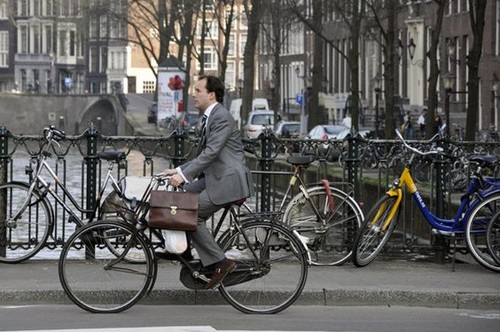 |
A man in suit on bike in Amsterdam. According to the Netherlands' Ministry of Transport, Public Works and Water Management, here 25% of trips to work are made by bike. (Photo: sydneycyclechic.org)
|
Q: Do you bike to everywhere?
A: Yeah, biking to supermarkets is very normal. You ride to school or even to everywhere under 10km. Of course, some people will drive cars if the distance is more than that but for 2 or 3 km, people definitely use bikes.
Q: What about parking? Is it safe to just park it wherever you want?
A: You have to lock it of course. Many bikes, especially the electric bikes, are so expensive. If you don’t lock it well or use special parking places, then it will be stolen.
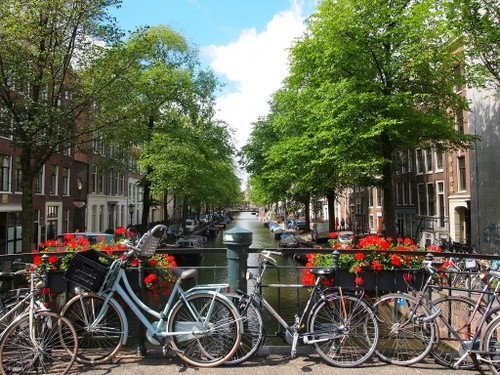 |
Bikes are everywhere in the Netherlands. Some are just parked along the bridge over the canal. (Photo: The Dangerous Business' Travel Blog)
|
Q: So e-bike or electric bike is on a rise in the Netherlands. Do you need a driving license to ride it?
A: No, because you cannot ride fast even if you use electric bikes, only 20-30 km per hour. It can be dangerous sometimes when someone goes slowly but an e-bike, which goes really fast, suddenly comes and results in dangerous situations. But a driving license for bikes is a little big too much although it can be more dangerous than normal bikes.
Q: It’s not very expensive to own a bike, is it?
A: It depends on what you want. For example, many students go to the train, to the town or to the university, they have really cheap bike, just like me. I can park it everywhere with just a simple look. If I have an expensive bike, then I will need to think where to park it. At the train station, there are special parking places but you have to pay for them. But with an old and crappy bike, you don’t have to worry about it. Thieves won’t steal it because it looks really bad. A normal bike is affordable and such a cheap options, compared to cars or motorbikes.
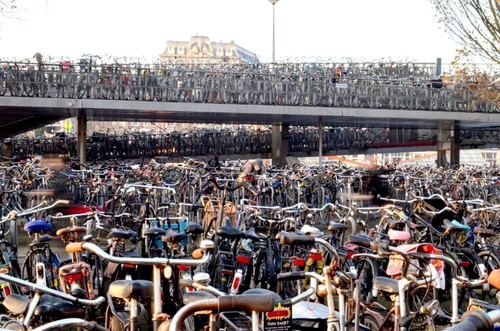 |
| The multi-storey parking lot at the Central Station in Amsterdam. Though this facility can hold up to 4,000 bikes, it is always full. (Photo: beyondthecentralpark.com) |
Q: There are so many canals in your countries and as I can see from photos and movies, the bicycle lane is so close to those canals and there is almost no barrier for you bikes. Is it dangerous?
A: No, no, of course not. We know how to bike so we don’t ride into it. Maybe only when you’re drunk (laugh). Normally, no. It’s not dangerous.
Q: The other day, I read a news story that government in Amsterdam had to clean all the bikes that people dumped into the canals. Is it a normal thing for people in the Netherlands to do so? Just throwing your bikes into the river?
A: No it’s not normal. Some people do it of course. But not every city in Netherlands has that many canals and rivers like Amsterdam. Or those bikes got stolen or people don’t know what to do with their old bikes and don’t want to go to special places to dispose it. But I would never do it. It’s not good. If the police see you do that, you can get a fine.
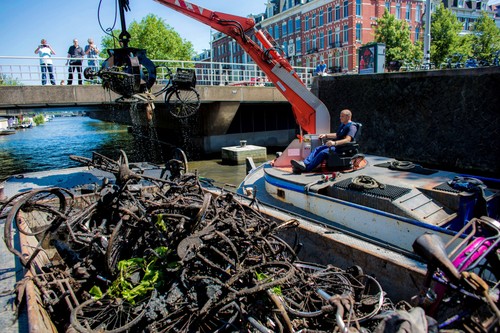 |
| The Waternet boats help keep the canals clean, as well as dredging up to 15,000 abandoned,stolen or vandalised bikes from the canal every year (Photo: Alamy/Ton Koene) |
Q: How many bikes have you got so far?
A: Wow, that’s a very difficult question. When I was really young, I got my first bike. So until now, I think I had had 5 or 6 bikes.
Q: Why so many? Is it the same to other people?
A: I think for every Dutch people, their bikes got stolen at least once. There are always bicycle thieves. My bikes also got stolen. And if you move to another city to study for example, you need a bike there. But you also need a bike to go around when you come back. So from when I was young to now, I have 5 or 6 bikes, yeah!
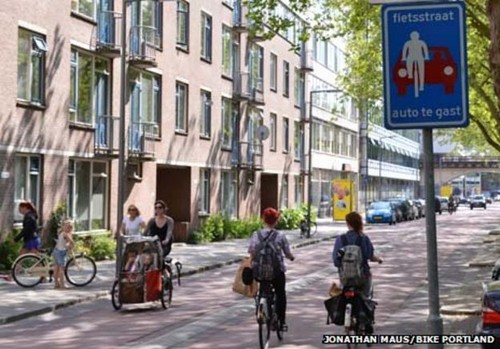 |
A sign in the Netherlands reads 'Bike street: Cars are guests' (Photo: Bike Portland/Jonathan Maus)
|
Thank you Julia for the conversation! And that’s been Culture Rendezvous on VOV24/7. Join us next time to discover more unique culture features from around the world. For now, good-bye!